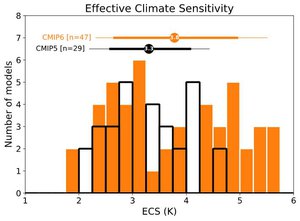How much will Earth warm in response to increased concentrations of greenhouse gases in the atmosphere? Answering this question is a key goal of climate science, given its importance for society. CO2 quadrupling experiments routinely conducted by global climate modeling centers around the world yield a wide range of climate sensitivities to carbon dioxide. In this talk, I will discuss why climate sensitivities in the latest state-of-the-art models are substantially larger than in their predecessors. The primary culprit is clouds: Planetary warming causes low-level clouds to become less extensive and less reflective, inducing further warming – an amplifying feedback that has strengthened in the latest models. This stronger positive cloud feedback arises due to changes in model physics and may be related to improved representation of cloud ice and liquid water content. Given the prominence of low cloud feedback in driving uncertainty in climate sensitivity, I will then discuss our efforts to constrain the global marine low cloud feedback using satellite observations of how low cloud properties respond to meteorology. This work indicates that the observed sensitivity of low clouds to their environmental controls is incompatible with very high or very low values of climate sensitivity.

On average, the latest models (CMIP6) exhibit higher climate sensitivity than their predecessors (CMIP5), and many models have values above 4.5˚C, the upper limit of the likely ECS range as determined by the Intergovernmental Panel on Climate Change.
This work was performed under the auspices of the U.S. Department of Energy by Lawrence Livermore National Laboratory under Contract DE-AC52-07NA27344. It is supported by the Regional and Global Model Analysis Program of the Office of Science at the DOE. IM Release # LLNL-ABS-812911.

